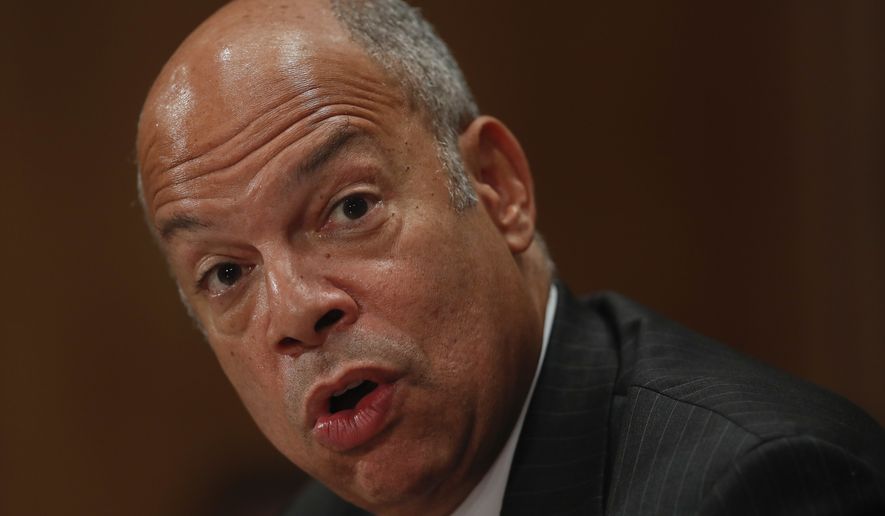The Gambia has refused to accept nearly 2,000 people the U.S. is trying to deport, forcing the Obama administration to pull the trigger and refuse to grant visas to some Gambians hoping to visit the U.S., the State Department said this weekend.
Homeland Security Secretary Jeh Johnson took the decisive move after years of prodding by lawmakers on Capitol Hill, signing a letter triggering the law that requires a halt in visas to countries that are refusing to accept their own citizens. Under the law, the State Department had no choice but to comply.
“As of October 1, 2016, the U.S. Embassy in Banjul, The Gambia has discontinued visa issuance to employees of the Gambian government, employees of certain entities associated with the government, and their spouses and children, with limited exceptions,” a State Department official said.
The Gambia is the first country in 15 years to face such a penalty. Some saw the move as an attempt to deflect pressure from Democratic presidential nominee Hillary Clinton, who never stripped countries of visas during her four years in the State Department, even as the backlogs grew. GOP nominee Donald Trump has said he would be quicker to pull the trigger on visa sanctions against countries that refuse their deportees.
Section 243(d) appears to say that all visas are to be denied — though the Obama administration has only announced sanctions against government officials and their close relatives.
Still, that could be a powerful lever. The only time the law was triggered before, against Guyana in 2001, it produced full cooperation from that South American nation in less than two months.
An official from the Gambian embassy in Washington recently told The Washington Times that as many as 1,800 Gambian citizens were caught in a backlog. He suggested one solution was to have U.S. taxpayers foot the bill for Gambian immigration authorities come to the U.S. to review the cases.
Still, he insisted his country is trying to cooperate.
“Our country respects the laws of the United States, and we are working closely with the U.S. authorities to take care of the situation,” said Hamba Manneh, counselor at the Gambian embassy.
Overall, tens of thousands of immigrants from across the globe are still in the U.S. because their countries won’t take them back, and pressure is mounting from Democrats and Republicans on Capitol Hill.
Sen. Chuck Grassley, the Iowa Republican who first revealed the move against The Gambia on Friday, said it was about time the administration targeted someone. He said he hopes more countries face the same punishment if they don’t begin to cooperate, and he said if The Gambia doesn’t straighten out, he hopes the U.S. broadens the visa sanctions to more than the government.
“It’s time we make clear to these nations that blocking U.S. deportation efforts by refusing to take back their citizens has consequences,” said Mr. Grassley, chairman of the Senate Judiciary Committee.
More than 30,000 Cubans — the vast majority with criminal records — are awaiting deportation but have been released onto the streets in the U.S. because Cuba refuses to take them back. China is another major offender, placing high on the list of nearly two dozen recalcitrant countries identified by Homeland Security.
The Gambia is ranked No. 11 on that list, according to Jessica Vaughan, policy studies director at the Center for Immigration Studies.
She said there’s now a major hurdle to cooperating: Most of the Gambians awaiting deportation have been released onto the streets — including hundreds with criminal records — so tracking them down to deport them could be difficult.
“If The Gambia agrees to take back their criminals, how will ICE find them if most of them are at large?” she said.
The results of countries refusing to take back their deportees can be tragic.
Jean Jacques, a Haitian man whose country refused to take him back after he served prison time in the U.S. for attempted murder, was released onto the streets and went on to kill a young Connecticut woman last year after a drug dispute with her boyfriend.
Haiti had refused to take Jacques back because he lacked identity documents, and officials questioned whether he really was Haitian.
An inspector general’s investigation found that Immigration and Customs Enforcement (ICE) agents didn’t take every step to try to force Jacques to obtain identity papers that could have helped ship him home.
Officials from both the State Department and ICE said they don’t use the visa sanction punishment lightly, saying it is part of a complex diplomatic dance.
“Use of this authority must be considered in light of both the potential impact it could have on U.S. foreign and domestic policy interests, particularly with respect to adverse effects on bilateral relations with a foreign partner, and whether visa restrictions will be an effective tool in gaining the country’s compliance,” an ICE official said.
Steps short of visa sanctions include issuing a series of official letters and demanding meetings with ambassadors.
Some members of Congress have said if countries still won’t cooperate, the U.S. should strip them of any funds they get.
• Stephen Dinan can be reached at sdinan@washingtontimes.com.




Please read our comment policy before commenting.